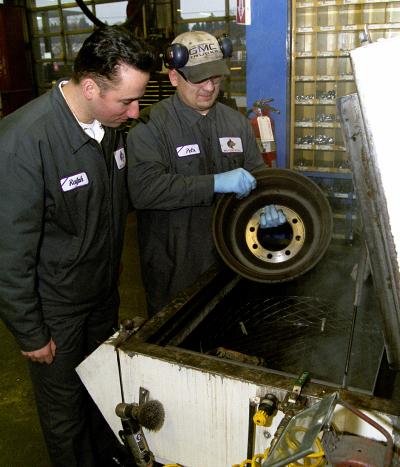December 9, 2004
Facilities Services’ ‘five-star’ Motor Pool just keeps winning awards
When the UW Motor Pool was honored recently for pollution prevention, it was the fourth time in the last year it has been singled out for its environmentally friendly efforts.
The unit, which maintains a fleet of vehicles for University use, was first honored a year ago with a four-star “Envirostars” award from King County. They made it five stars shortly thereafter. Motor Pool was then named Recycler of the Year along with UW’s Surplus Property by the Washington State Recycling Association, and most recently it received the Governor’s Award for Pollution Prevention and Sustainable Practices, given by the state Department of Ecology’s Hazardous Waste and Toxics Reduction Program.
Given that Motor Pool is part of Facilities Services, its accolades aren’t surprising. Facilities Services is “committed to environmental stewardship and the principles of sustainability,” as the unit’s recent report on the subject says. And Facilities Services has recently won its own Governor’s Award for Energy Management, given by the Energy and Architectural Services Office of the state’s General Administration Department. That award honors the UW for energy efficiency, energy cost savings, maintenance and operations and sustainable designs in new buildings.
But Motor Pool’s success is somewhat unusual, especially since its stock in trade is petroleum-powered vehicles, not usually thought of as environmentally friendly.
“We generate a lot of waste,” admits Motor Pool Manager David Carr. “Cars pollute a lot. So we’ve done everything we can to reduce the impact.”
Carr has been running Motor Pool since 1995, and one of the first things he did when he arrived was to switch to rerefined motor oil when possible. Rerefined oil, he explains, is the result of old oil that’s turned in at auto shops being reprocessed, with additives put back in, and sold.
“Rerefined oil is cheaper and runs just as well as new,” Carr said. “It doesn’t come in all weights so we can’t use it in all our vehicles, but I’d say we use it in about 60 percent of our fleet.”
And that isn’t the only way Motor Pool uses recycled oil. Waste oil from the vehicles is used to heat the shop area. Coolant is recycled too.
“We have a vendor who comes in with a device on his truck and he does this for us,” Carr explained. “He takes all the impurities out of the coolant, puts in an additive package, tests it for pH, then puts into storage for reuse in our vehicles. So instead of hauling away a 55-gallon drum of old antifreeze, he leaves us with a half-gallon of green stuff that we have Environmental Health and Safety haul away. That’s mostly sludge.”
The shop also has cut down on its use of chemicals, Carr said. Grease and oil used to be removed from auto parts using solvent, but those parts are now placed in a dishwasher-like device that cleans them with soap and hot water.
Motor Pool is conscientious about recycling the fairly large amount of scrap metal it generates, too. Even old oil filters that used to be thrown away are now drained, crushed and sent to a recycling plant where they are melted down for reuse.
“Some of the changes we’ve made have come from me and some have come from the guys in the shop,” Carr said. “It’s been a pretty collaborative thing.”
When the employees complained about the lights in the shop being too dim, for example, Carr asked for an analysis that resulted in new fluorescent fixtures and reflectors that produce a brighter shop with lower energy costs.
Because Motor Pool has a car wash facility, they were conscious of polluted water running into the storm drain. “We didn’t want that to happen so we built this basin that captures water from anything we wash,” Carr said. “It goes through an oil/water separator and then it goes into the sewer. The oil is pumped out and handled by a contractor.”
One of the most recent efforts at pollution prevention has been removing mercury switches from vehicles. These switches turn on trunk and hood convenience lights when the trunk or hood is raised, Carr explained, and each one contains more than a gram of mercury. The local hazardous waste management program estimates that between 35 and 108 pounds of mercury are released every year in King County when old cars are shredded and smelted for recycling.
Motor Pool removed about 35 or 40 of these switches from its older vehicles as part of a countywide effort, Carr said, replacing some with ball bearing switches.
Carr is also working toward using alternative fuels in the Motor Pool fleet. He has purchased 18 Priuses, a hybrid vehicle that uses electricity as well as gas. He’d like to have more, but Priuses cost about twice as much as a comparable non-hybrid car, and their fuel economy doesn’t yet make up for the additional cost. The fleet also includes a number of “flexible fuel vehicles,” equipped to use ethanol as well as gasoline. So far, however, this alternative fuel has not been available in Seattle.
As for the approximately 50 diesel vehicles in the fleet, Carr wants to use biodiesel, a blend of standard petroleum diesel fuel and fuel made out of vegetable oil. Biodiesel isn’t yet available in Seattle either, but there are plans to introduce it in 2005, and Carr plans to be ready.
“We’ve been thinking about sustainability so long now that it’s just became part of what we do,” Carr says of Motor Pool’s efforts. “It’s good business practice because we save some money and cut down our waste stream. And it’s also good for our working environment and the environment in general.”



